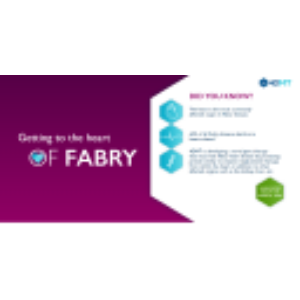4DMT Receives FDA Regenerative Medicine Advanced Therapy (RMAT) Designation for 4D-150 Genetic Medicine for Intravitreal Treatment of Wet AMD, the First RMAT Designation in Wet AMD
- Designation follows interim Phase 1 PRISM clinical data for 4D-150 that demonstrated an encouraging safety, tolerability and clinical activity profile in patients with wet age-related macular degeneration (wet AMD)
- 4D-150 is the first therapeutic candidate to receive either RMAT or Breakthrough Designation for wet AMD
- RMAT designation follows Priority Medicines (PRIME) designation received from the European Medicines Agency (EMA) in October 2023
- Receiving both RMAT and PRIME enables increased collaboration between the FDA and EMA on regulatory approval planning, in addition to the opportunity for expedited product development
- Initial interim landmark data from 4D-150 Phase 2 PRISM randomized Dose Expansion stage (N=50 at 24 Weeks) in advanced, high treatment need wet AMD patients to be presented at Angiogenesis, Exudation, and Degeneration 2024 Conference on Saturday, February 3, 2024 at 4:20 p.m. ET
EMERYVILLE, Calif., Dec. 21, 2023 (GLOBE NEWSWIRE) -- 4D Molecular Therapeutics (Nasdaq: FDMT, 4DMT or the Company), a leading clinical-stage genetic medicines company focused on unlocking the full potential of genetic medicines to treat large market diseases in ophthalmology and pulmonology, today announced that the U.S. Food and Drug Administration (FDA) has granted the RMAT designation for the investigational genetic medicine candidate 4D-150 for intravitreal treatment of wet age-related macular degeneration (wet AMD). The FDA granted RMAT designation based on the potential of 4D-150 to address the unmet medical need within this population.
RMAT designation is part of the 21st Century Cures Act. The program was created to expedite the development and review of regenerative medicine therapies intended to treat, modify, reverse or cure a serious condition. Receiving RMAT designation offers sponsor companies all the benefits of the fast track and breakthrough therapy designation programs, allowing for early, close and frequent interactions with the FDA with the goal of expediting drug development. The designation follows interim Phase 1 PRISM clinical data for 4D-150 that demonstrated an encouraging safety, tolerability and clinical activity profile. 4D-150 has the potential to address an unmet medical need to safely maintain long-term visual acuity outcomes while avoiding the need for repeated intravitreal injections. 4DMT is currently working with the FDA and EMA on preliminary Phase 3 clinical trial plans and expects to provide an update in February 2024 along with 4D-150 interim randomized Phase 2 PRISM trial data.
“We are honored to receive the first ever RMAT designation for an investigational treatment for wet AMD with our intravitreal 4D-150 genetic medicine,” said David Kirn, M.D., Co-founder and Chief Executive Officer of 4DMT. “This designation validates our belief in 4D-150’s potential to address the high unmet need of wet AMD patients, to maintain their visual acuity outcomes, and to reduce their treatment burden. We continue to work closely with the FDA and EMA on efficiently advancing 4D-150 development for both wet AMD and diabetic macular edema, and having both RMAT and PRIME designations enables us to further collaborate expeditiously in our efforts to advance development in both geographies.”
“Wet AMD patients are waiting for a durable therapy with the potential to significantly reduce treatment burden and preserve vision long term,” said Robert Kim, M.D., Chief Medical Officer of 4DMT. “We are grateful that the two largest pharmaceutical regulatory agencies in the world recognize 4D-150’s potential by awarding the unprecedented combination of both RMAT and PRIME designations in wet AMD. I am incredibly proud of the team at 4DMT for this accomplishment and we look forward to sharing initial interim data from our randomized Phase 2 Dose Expansion clinical trial in the highest anti-VEGF need patients in February at the 2024 Angiogenesis Conference.”
In July 2023, 4DMT announced that a dose response was demonstrated in favor of the highest tested dose of 3E10 vg/eye, including a promising reduction in supplemental anti-VEGF injections (4 of 4 evaluable patients injection-free) and a clinically meaningful reduction in mean central subfield thickness (CST) at 36 weeks in a patient population with high anti-VEGF need. As of July 2023, intravitreal 4D-150 remained well tolerated at all doses in all patients, with no Grade ≥1 inflammatory cells, hypotony, dose-limiting toxicities or treatment-related serious adverse events (SAE) during follow-up through 36 weeks in all 15 patients. Additionally, 4DMT announced that the 3E10 vg/eye dose cohort showed a durable reduction in supplemental anti-VEGF injections beyond 36 weeks, with 3 of 4 evaluable participants remaining injection-free beyond one year and one patient remaining injection-free during a maximum follow-up of 80 weeks with no change in safety profile observed.
About 4D-150 for Wet AMD
4D-150 is comprised of our customized and evolved intravitreal vector, R100, and a transgene cassette that expresses both aflibercept and a VEGF-C inhibitory RNAi. This dual-transgene payload inhibits four members of the VEGF angiogenic family of factors that drive wet AMD and DME: VEGF A, B, C and PlGF. R100 was invented at 4DMT through our proprietary Therapeutic Vector Evolution platform; we developed this platform utilizing principles of directed evolution, a Nobel Prize-winning technology. 4D-150 is designed for single, low-dose intravitreal delivery for transgene expression from the retina without significant inflammation.
About Wet AMD
Wet AMD is a highly prevalent disease with estimated incidence rate of 200,000 new patients per year in the United States. It is estimated that the total prevalence of wet AMD in the major markets, including the U.S., EU (major markets), and Japan, will be greater than 4 million individuals in the next five years. Wet AMD is a type of macular degeneration where abnormal blood vessels (choroidal neovascularization or CNV) grow into the macula, the central area of the retina. As a consequence, CNV causes swelling and edema of the retina, bleeding and scarring, and causes visual distortion and reduced visual acuity. The proliferation and leakage of abnormal blood vessels is stimulated by VEGF. This process distorts and can potentially destroy central vision and may progress to blindness without treatment.
About 4DMT
4DMT is a leading clinical-stage genetic medicines company focused on unlocking the full potential of genetic medicines to treat large market diseases in ophthalmology and pulmonology. 4DMT’s proprietary invention platform, Therapeutic Vector Evolution, combines the power of the Nobel Prize-winning technology, directed evolution, with approximately one billion synthetic AAV capsid-derived sequences to invent customized and evolved vectors for use in our wholly owned and partnered product candidates. Our product design, development, and manufacturing engine helps us efficiently create and advance our diverse product pipeline with the goal of revolutionizing medicine with potential curative therapies for millions of patients. Currently, 4DMT is advancing five clinical-stage and two preclinical product candidates, each tailored to address rare and large market diseases in ophthalmology, pulmonology, and cardiology. 4D Molecular Therapeutics™, 4DMT™, Therapeutic Vector Evolution™, and the 4DMT logo are trademarks of 4DMT.
All of our product candidates are in clinical or preclinical development and have not yet been approved for marketing by the FDA or any other regulatory authority. No representation is made as to the safety or effectiveness of our product candidates for the therapeutic uses for which they are being studied.
Learn more at www.4DMT.com and follow us on LinkedIn.
Forward Looking Statements:
This press release contains forward-looking statements within the meaning of the Private Securities Litigation Reform Act of 1995, as amended, including, without limitation, implied and express statements regarding the therapeutic potential, and clinical benefits of 4DMT’s product candidates, as well as the plans, announcements and related timing for the clinical development of and regulatory interactions regarding 4D-150. The words "may," “might,” "will," "could," "would," "should," "expect," "plan," "anticipate," "intend," "believe," “expect,” "estimate," “seek,” "predict," “future,” "project," "potential," "continue," "target" and similar words or expressions are intended to identify forward-looking statements, although not all forward-looking statements contain these identifying words. Any forward looking statements in this press release are based on management's current expectations and beliefs and are subject to a number of risks, uncertainties and important factors that may cause actual events or results to differ materially from those expressed or implied by any forward-looking statements contained in this press release, including risks and uncertainties that are described in greater detail in the section entitled "Risk Factors" in 4D Molecular Therapeutics’ most recent Quarterly Report on Form 10-Q as well as any subsequent filings with the Securities and Exchange Commission. In addition, any forward-looking statements represent 4D Molecular Therapeutics' views only as of today and should not be relied upon as representing its views as of any subsequent date. 4D Molecular Therapeutics explicitly disclaims any obligation to update any forward-looking statements. No representations or warranties (expressed or implied) are made about the accuracy of any such forward looking statements.
Contacts:
Media:
Katherine Smith
Evoke Canale
Katherine.Smith@evokegroup.com
Investors:
Julian Pei
Head of Investor Relations and Corporate Communications
Investor.Relations@4DMT.com
267-644-5097








